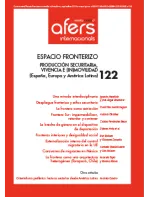Internal borders: informal practices in governing inequality in Spain

Taking Spain as a case study, this paper analyses the institutional production of border apparatus within reception countries, which affect very diverse areas of the daily life of migrants. Hence, rather than as a rigid line dividing the population into included and excluded, the border is approached as a flexible governance mechanism that differentially regulates access to rights. Starting by analysing the formal and informal operation of some of the institutions that manage the process (immigration offices, social services and the healthcare system), an attempt is made to give an account of the norms, requirements, administrative procedures and infra-penal mechanisms that especially affect vulnerable groups, stratifying the recognition of rights and condemning subjects to a legal limbo in which their legitimacy is – at best – blurred.
Keywords:border, social inequality, differential inclusion, healthcare, immigration, social services, Spain
DOI: doi.org/10.24241/rcai.2019.122.2.111
>> The full text articles of this issue are available only in Spanish language
How to cite this article:
Pérez, Marta; Ayala Rubio, Ariadna; Ávila, Débora y García García, Sergio. «Fronteras interiores: las prácticas informales en el gobierno de la desigualdad en España». Revista CIDOB d’Afers Internacionals, n.º 122 (septiembre de 2019), p. 111-135. DOI: doi.org/10.24241/rcai.2019.122.2.111
information about the authors:
Marta Pérez, profesora asociada, Universidad Complutense de Madrid (UCM)
Ariadna Ayala Rubio, investigadora postdoctoral, UCM
Débora Ávila, profesora titular interina, UCM
Sergio García García, profesor ayudante doctor, UCM